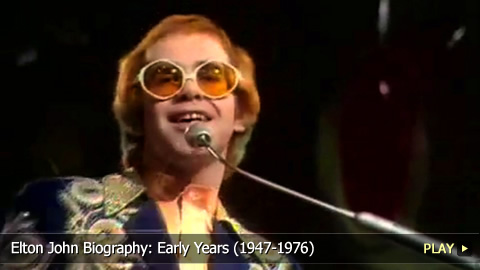Elton John Biography: Early Years (1947-1976)

- Early Years
- Bluesology
- Bernie Taupin
- Your Song
- Musical Style
- Show at the Troubadour
- More Hit Albums
- Goodbye Yellow Brick Road
- John Lennon
- Caribou
- Captain Fantastic
- Flamboyant Style and Persona
- Dismantling the Elton John Band
- Duet with Kiki Dee
- Admits Bisexuality
- Ongoing Struggle with Addiction
- More to Come
Early Years
Reginald Kenneth Dwight was born March 25th, 1947 in a London suburb. This child prodigy began playing piano at age four, and received a Royal Academy of Music scholarship at 11. Within four years, he was covering songs at local pubs.
Bluesology
His parents encouraged him to follow a traditional career path. But he left school at 17 to pursue music, and joined Bluesology. With them, he backed musical greats like The Isley Brothers and Patti LaBelle and The Bluebelles.
Bernie Taupin
Meanwhile, Dwight sought work elsewhere. On an audition in 1967, he was introduced to lyricist Bernie Taupin, and the two began writing songs for other artists through the mail. Six months later, Reggie Dwight adopted the name that honored his idols Elton Dean and Long John Baldry.
“Your Song”
By mid-1968, Elton John was recording his and Taupin’s music. The 1969 album Empty Sky fizzled, but the next year he had a hit with his self-titled album, mainly due to the single “Your Song.”
Musical Style
John’s music meshed influences and styles, but his vocal twang implied inspiration by Southern American rock. He bridged the gap between traditional pop artists and reflective singer-songwriters. John/Taupin compositions were rarely introspective in content, but they successfully blended electric guitar with Elton John’s trademark piano.
Show at the Troubadour
In August 1970, John introduced himself to American audiences at Los Angeles’ Troubadour club. He built momentum, and earned significant radio airplay, with the western-flavored Tumbleweed Connection, as well as the live, gospel and boogie-woogie-inspired 11-17-70.
More Hit Albums
Next was 1971’s top ten album Madman Across the Water. But the following year, he really became a household name: Honky Chateau was his first of seven straight U.S. chart-topping albums. Less than a year later, Don’t Shoot Me I’m Only the Piano Player produced two more popular tracks.
Goodbye Yellow Brick Road
1973’s rock-and-roll classic Goodbye Yellow Brick Road eventually went seven times platinum in the U.S., and produced four singles, including one number one. Elton John’s place at the top of the rock food chain was secured.
John Lennon
John’s success stemmed from the fact he was considered the first original act to emerge after the breakup of The Beatles. He even collaborated with former Beatle John Lennon in 1974 on “Whatever Gets You Thru the Night.”
Caribou
1974 also saw the release of the hastily-produced Caribou. Despite shortcomings, singles like “Don’t Let the Sun Go Down on Me” shot it to number one.
Captain Fantastic
In 1975, Elton John appeared with other huge rock acts in the film adaptation of The Who’s rock opera “Tommy.” He also released Captain Fantastic and the Brown Dirty Cowboy, which recalled the struggles John and Taupin suffered during their early career. It was the first album ever to debut at number one.
Flamboyant Style and Persona
The stand-alone single “Philadelphia Freedom” about his friend tennis great Billie Jean King also came in 1975. When he played the song on “Soul Train” that year, he became one of the few white performers to appear on the show. By this point, John was established as a preeminent and stylish showman. Soon his on-stage costumes became increasingly flamboyant and wacky.
Dismantling the Elton John Band
Following Captain Fantastic, John dismantled his longtime band ahead of his next album. Rock of the Westies also debuted at the top of Billboard, and yielded the number one “Island Girl.”
Duet with Kiki Dee
The live record Here and There arrived in 1976, as did his eleventh studio album Blue Moves. That effort focused less on rock and spawned the mature single “Sorry Seems to Be the Hardest Word,” as well as several concert favorites. But his upbeat duet with Kiki Dee was the year’s biggest victory.
Admits Bisexuality
He kept busy by becoming involved with the Watford Football Club. He capped off 1976 by maintaining a relentless touring schedule, and by famously admitting his bisexuality in a controversial “Rolling Stone” interview.
Ongoing Struggle with Addiction
However, the stress of his busy schedule and public persona strained the naturally shy musician: John struggled with bulimia and became increasingly dependent on drugs and alcohol.
More to Come
During the first part of his career, Elton John went from child prodigy to one of the world’s biggest entertainers. Of course, there was much more to come.


 0
0
 0
0
 report
report